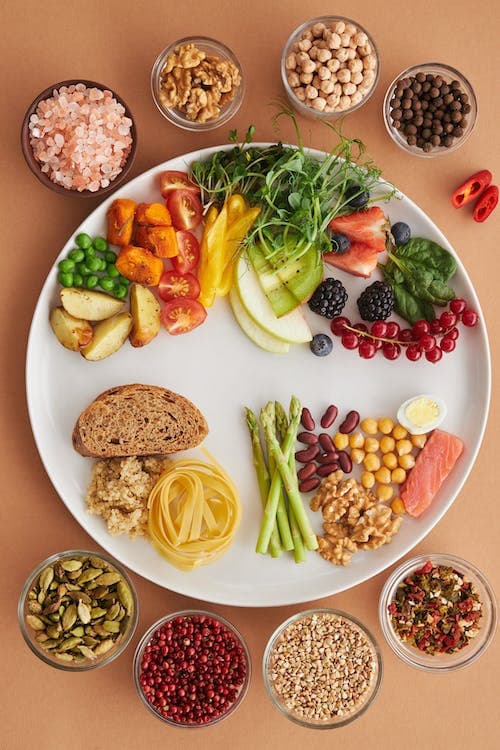When is a calorie not a calorie? Are all calories burned in the same way? Are calories from some foods better for weight loss than others?
This article will answer all of these questions and more, but first: what actually is a calorie?
What are calories?
A calorie is a term of measurement given to units of energy. All foods and drinks contain energy in their chemical structure, and this is released during the process of digestion. Your bodily cells utilise this energy to function, and any unused units of energy are stored as fat (1).
To maintain a healthy weight, we should aim to consume the same number of calories that we use each day. The simple way of looking at weight management is 'calories in, calories out'. If you consume the same number of calories that your body uses each day, you'll maintain the same weight; if you consume fewer calories than you use each day, you'll lose weight, and obviously if you consume more calories than you use, you'll gain weight. This premise is commonly accepted as being the foundation for most weight management programmes.
But are all calories absorbed and used in the same way? The answer is, not quite.
Read on to find out how the calories from different foods are metabolised in different ways, with different outcomes for weight loss or gain.
The thermic effect of food
The truth is that not all calories are equal. Different foods we consume go through different biochemical pathways, and are metabolised and digested at different rates. Calories from different foods have different effects on fullness, insulin response, the process of turning carbs to body fat, and metabolic energy expenditure. This is defined as the thermic effect of food (known as TEF). It is calculated based on the amount of energy in any given food, compared to the energy which is required to metabolise and digest it.
This mean some foods will not require much energy to metabolise, meaning that more of the calories they contain will be left over after they've been digested. It's commonly accepted that protein has a much higher thermic effect (20-35%) compared to carbs (5-10%) and fat (0-3%)(2). This is because protein is not digested as efficiently as carbs and fat, so our metabolic rate is increased after consumption and a large part of the calories it contains will be used up in order to metabolise it. If we use these figures as a guide, then out of 100 calories of protein only 70 calories will remain usable after digestion. For example, if you obtain a lot of your calories from protein, more of these calories are likely to be burned during metabolism and you'll be less likely to put on excess weight.
This is why many people on a weight loss diet choose to increase their protein intake, and there are many other ways in whichprotein can aid weight loss.
The percentages of thermic effect may also vary from person to person, however; for example, the thermic effect of foods is reduced in older adults (3).
Read this article if you're unsure about how much protein you should be eating.
The amount of calories we need each day can also depend on many other factors, and our individual needs can vary quite dramatically. Let's explore some of the other factors that can affect our recommended daily intake.
How many calories do you need each day?
The number of calories we need to consume each day will be based on our individual Basal Metabolic Rate (BMR), which is the minimum number of calories required to perform your body's daily functions, like breathing, circulation, digestion, and cell production, or our Resting Metabolic Rate which also factors in a degree of essential activity like going to the loo and showering. Most calculations are based around resting metabolic rate as this is more accurate. Our BMR/RMR gradually declines as we get older, which is one of the reasons why we need fewer calories in later life (4,5,6).
These rates are calculated using algorithms based on direct or indirect calorimetry (7). If you want to calculate your basal or resting metabolic rate, you can find calculators online; however, beyond our body's basic energy requirements, our optimum daily calorie intake will also depend on many other different factors:
There are so many things which can positively or negatively affect our BMR, but some people do seem to be born with a faster metabolism than others. Research suggests certain genes, such as the 'FTO gene', are associated with a lower BMR and obesity.(11)
The amount of calories we need when fitness training depends on whether we want to lose weight or bulk up. Those wishing to lose weight should eat a calorie deficit, meaning that they consume more calories than they use up each day. Conversely, those wanting to bulk up will typically want to eat more calories than they use. If you just want to maintain a healthy weight, you'd aim to eat the recommended daily intake for your age, gender, and activity level.
How many calories do different exercises burn?
Again, the amount of calories we burn during exercise can vary from person to person, and will also depend on your age, gender, height, and body weight.
For example, one hour of high impact aerobics uses 365 calories per hour for a 25 year old woman, who weighs 120 lbs and is 5ft 5 inches tall. However, a 35 year old man, who weighs 170lbs and is 6ft 1inch tall, would use 690 calories per hour for the same exercise (15).
There are lots of exercise calorie counters online - look for one which factors in your age, height, weight, and gender, for a more accurate calculation.
Summary: all calories are not the same!
Ultimately, if you wish to lose, maintain, or gain weight, you'll always need to consume the corresponding number of calories, but we've learned that not all calories are equal! Depending on the food they're derived from, the lifestyle and needs of the person who is metabolising them, and the rate at which they are used up for energy or stored by the body, they can vary dramatically. However, armed with this information you can more accurately work out your own healthy daily calorie intake. Calories are not the only consideration if you want to lose weight; it's really important that you eat a healthy, balanced diet.
If you feel you have a significant amount of weight to gain or lose, it's always best to speak to your doctor or health professional before embarking on a supporting diet. If you struggle to create meals that contain the right amount of calories and protein for your needs, consider subscribing to a healthy meal prep service designed to support weight loss or gain protocols, and containing measurable amounts of calories and protein.
If you enjoyed this article, read these related articles on our blog:
How to lose, gain, or maintain with Prep Kitchen
How to stay fit if you sit 9 to 5
16 easy exercise and diet tips to cut belly fat
References:




